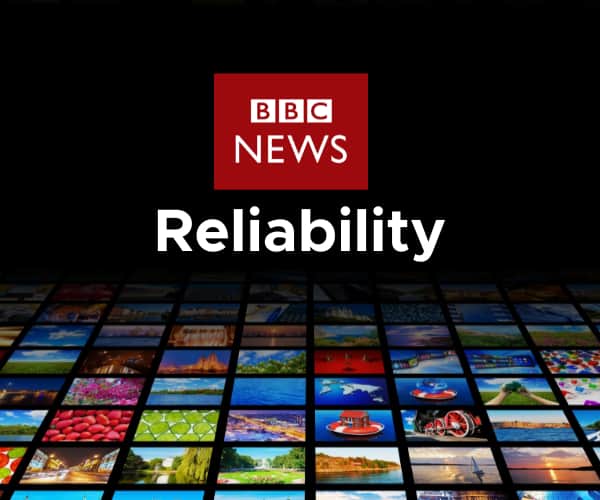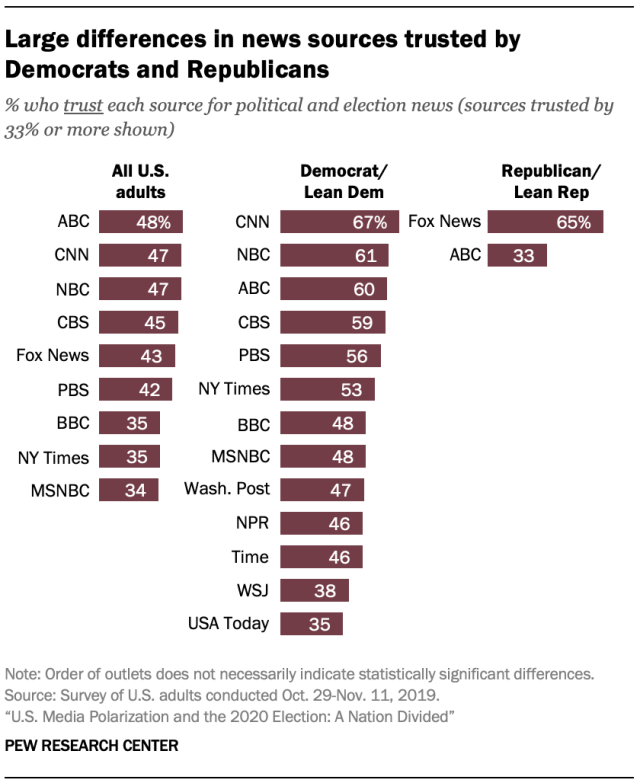
Being one of the top biggest news websites in the U.S. despite residing in the U.K., the British Broadcasting Company remains one of the most well-known news sources among other options. The BBC is the first national broadcasting organization, being created in 1922 within the United Kingdom, it has been able to catch readers’ attention as it reinforces the importance of unbiased journalism. The BBC offers radio segments, various TV channel options, and an online website full of current news affairs worldwide. The BBC has five missions to the public they have tried to remain loyal to including a goal to remain impartial.
In this blog post, BBC’s reliability will be assessed based on Biasly’s Accuracy Scores, an insight into their online articles, and a discussion of the criticisms BBC often faces. Has the BBC been effective and successful in completing their goal of delivering impartial news online?

(Graph inserted here: Pew Research Center. It shows the % of people that trust certain new sources (like the BBC) based on their political leanings. BBC is trusted by most Left-leaning and a good % of all U.S. adults.)
Does Reliability Matter?
Reliability, in general, refers to how trustworthy or accurate information, or in this case, a news source is. If we consider this definition, it quickly becomes clear why reliability is important in media sources. If we can’t trust the things we read then there isn’t much of a point in continuing to consume content from that source, after all. So how exactly can we gauge the reliability of a news source anyways?
There are several potential measures of reliability to look out for when trying to determine whether a media source is reliable or not. Red flags for an unreliable article can include the presence of wild unsubstantiated claims, facts dependent on other unreliable sources, heavy use of opinionated language, and more. Some indicators of a reliable news source, on the other hand, include things like:
- Absence of subjective/opinionated language in articles
- Credible sources cited (e.g., neutral sources, .gov, .edu websites)
- Facts and statistics backed by multiple relevant outside sources
- Use of primary sources when possible (e.g., interviews, quotes)
- Information that remains consistent across news sources
How Does BBC’s Reliability Score?
The political reliability index developed by Biasly objectively assesses news organizations’ accuracy and trustworthiness. BBC’s overall Reliability Score has been rated as ‘Fair’ by Biasly. This rating is a weighted average of two distinct scores: the Fact Analysis Score and the Source Analysis Score, each evaluating separate components of BBC’s Reliability. When computing the Average Reliability of the article the Fact Analysis score is more heavily weighted. These ratings are as follows in the next two paragraphs:
BBC’s Fact Analysis Score is ‘Good,’ which suggests readers can trust most of BBC’s content online. The Fact Analysis score focuses more on the accuracy of claims, facts, and sources presented in the article and any hints of selection and omission bias, which we will discuss further in the article.
BBC’s Source Analysis Score is ‘Fair,’ which suggests readers can trust some of the sources, links, and quotes provided by the news source. This score, which is based on A.I., focuses on assessing the quality of sources and quotes used including their number, lengths, uniqueness, and diversity.
However, since these scores are based on percentages and averages, individual articles could be more or less trustworthy depending on the context, author, and other factors. Our findings show that BBC’s reliability is mostly but not all factual because they have retracted several stories in the past or had pieces that were not factual.
Let us analyze the supporting data for BBC’s rankings and discuss what to watch out for while searching for trustworthy news sources.
BBC’s Accuracy & Reliability
Ofcom’s fifth annual report on the BBC has found that one of the main criticisms faced by the BBC has been the complex issue of being truly impartial. However, it’s important to note here that bias does not necessarily mean a news source is neither reliable nor accurate. Information about world news, topics, and concerns are still able to be told factually and also not be perfectly Center-leaning all the time. Audiences also recognize this complex issue of impartiality, but the BBC has been able to remain relatively reliable in its news coverage despite this criticism.
Selection bias is when stories and facts are selected or deselected, often on ideological grounds, to create a narrative in support of the new sources’ ideology. Omission bias, on the other hand, is when different opinions and political views regarding a situation are left out so that the reader is only exposed to the ideological perspective supported by the author. It’s important to keep in mind these two types of biases when trying to assess an article’s level of accuracy.
Below are two BBC articles that show the differences between bias and reliability, despite being from the same news source:
Article 1: Minimum wage fight: “There’s no recovery without raising it”
This article received a Medium Liberal analyst bias score and a “Fair” Reliability Score. This is due to the issue covered being one that will garner the attention of those with Left-Leaning interests regarding these topics. The BBC was able to demonstrate one side- those that are fighting to raise the minimum wage but did not depict any of the opinions, sources, or facts from the opposing side. This example of selection and omission bias is the reason why this article received a low score in this category. While the information presented may not be wrong, it did fail to equally present both sides of the discussion.
A specific example includes the demonstration of various groups, individuals, and politicians in favor of raising the minimum wage. However, only one person from the opposing side was discussed, “…Sean Kennedy, executive vice president of public affairs for the National Restaurant Association, which opposed the increase to $15 in the relief bill, including the expansion to tipped workers.” This display of the topic is unbalanced and even includes a few inaccurate facts. The article discusses that corporations such as Walmart, Amazon, and Kroger “…have also set starting pay at that amount.” Upon diving deeper, Walmart and Amazon still vary from state to state regarding their starting wages. While $15 per hour may be true in some States, it is not accurate across locations.
Article 2: Abortion Rights: US Catholic bishops face a clash with Biden
Despite receiving a Somewhat Liberal analyst bias score, and in contrast with the previous example, this article received an “Excellent” Reliable score. So, what was the difference? What changed? This article was great at being able to show both sides of the conversation, from expressing the concerns religious officials had to those that are around President Biden.
There is little to no omission bias in this article, which results in a higher accuracy rating. This once again demonstrates how a bias does not always affect the reliability of a source, as audiences are still able to receive accurate information from this published online work. They have also done well in being able to show both sides and provide accurate quotes and claims, such as Rev. Liam Cary who stated President Biden was “a Catholic president who is opposed to the teaching” of the Church. Being able to have someone’s words presented without being twisted to push an agenda has helped this article accurately portray any side of this controversial debate.
So is BBC Reliable?
Having a long trajectory of being one of the most prominent news coverage companies, the BBC’s website through its online articles has been proven to stay relatively consistent in terms of reliability with a Good Reliable rating. Regardless of criticisms from both Left-Leaning and Right-Leaning individuals, BBC has been able to cover news from across the political spectrum which has allowed them to receive praise and criticism from any side, which has polished their sourcing and analysis teams.
This is a good example that shows they are not afraid to cover any news, no matter who it covers since they have emphasized their promise to the public to continue delivering impartial news. Not one news media source can ever truly be Center-leaning or unbiased all of the time, but reliability and accuracy prove to be one of the most important aspects that the BBC offers and continues to improve on.
Disclaimer: Pew Research Center bears no responsibility for the analyses or interpretations of the data presented here. The opinions expressed herein, including any implications for policy, are those of the author and not of Pew Research Center.




























